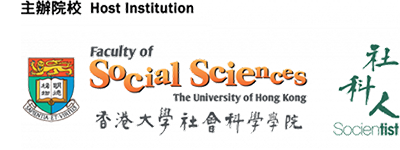Mass Adoption of the World Health Organisation Caregiver Skills Training (WHO-CST) Programme Bringing Benefits to the Society
Cases of students with ASD are on the rise
There is a global trend of rising number of people being diagnosed as having ASD. In Hong Kong, a similar trend of rapid increase in the number of children with ASD has been observed. According to statistics from the Education Bureau (EDB), in the five years from 2009/10 to 2013/14, the number of students diagnosed with ASD in public schools had increased from 2,050 to 4,970, more than doubled in five years. Many of these children with average or above intelligence are attending mainstream schools. In the school year 2017/18, students with special educational needs (SEN) took up 7.8% and 8.6% of students in mainstream primary and secondary schools respectively. Among them, the number of students with ASD was 8,872.
In view of the needs of these students, their families and the schools, the Hong Kong Jockey Club Charities Trust initiated the “JC A-Connect: Jockey Club Autism Support Network” (JC A-Connect) in 2015. The first of its kind in the city, to provide holistic support for children with ASD attending mainstream schools, and their parents. Starting from the 2021/22 school year, EDB has adopted this proven service model in public primary and secondary schools.
Introducing a WHO-accredited programme to provide appropriate assistance to caregivers
JC A-Connect adopted WHO-CST with HKU and a number of NGOs in 2018, with opinions and experiences of professionals and caregivers to localise the curriculum to better meet the needs of Hong Kong caregivers. While also trained up a number of certified master trainers and facilitators to provide training courses, to enhance caregivers’ capacity to fully utilise everyday play and home routines and have quality time with their children. Since 2021, JC A-Connect joined hands with various NGOs to localise the WHO-CST programme, aiming to train up more certified facilitators to carry out more parent training courses in Hong Kong.
TWGHs Ho Yuk Ching Educational Psychology Service Centre, Hong Kong Young Women’s Christian Association (HKYWCA) and SAHK have organised three Facilitator Certification Programmes, which lasted for a period of six to eight months, in the past year, and have trained 70 professional facilitators in Hong Kong. 27 groups of WHO-CST programme training were completed in the community, with the participation of as many as 254 parents.

A new toy set to go with the localised manual
In addition to organising different courses, TWGHs, HKYWCA and SAHK repackaged the training manuals with local elements to simplify the content and make it easier for parents to grasp the essence of the courses. They have also created a brand-new parent-child toy set for the courses, hoping that parents can utilise the interactive skills taught in the courses while enjoying the precious playtime moments with their children.
Course Support in Hopes of a Wide-scale Application in the Community
Course implemented in more than 30 regions worldwide
Experts from WHO, the Parent Association and the autism advocacy organisation in the United States of America – “Autism Speaks” designed the WHO’s “Caregiver Skills Training” and implemented it in more than 30 regions around the world. The principal distinguishing characteristic of the WHO-CST programme is that a formal diagnosis of any childhood disorder of the children is not required as a prerequisite for the caregiver’s entry into the programme, for obtaining the best result during early intervention.
Parenting programme enriching parent-child relationship
The WHO-CST programme is informative and practical that it attracts a lot of parents to attend, with a near 100% attendance rate. The course is divided into nine 90-minute sessions. According to Ms. Wong Kit Sum, a WHO-CST-HK Master Trainer and registered social worker of YWCA, the advantage of the course is that it allows parents to have certain amount of time to share and practise and gain new insights through revising old materials at the same time. For this reason, the efficiency of learning would be doubled. In order to continue providing guidance to parents in need amidst COVID-19, Ms. Lung Ka Ying, another Master Trainer of WHO-CST-HK and a registered social worker of SAHK, indicated that the programme was shortened to four sessions at the peak of the epidemic and physical classes were converted into online courses. Despite all the challenges, the programme continues to support the parents in need. “The benefit of in-person classes is that live demonstrations can be performed. Parents can master certain skills more precisely. There are also advantages of online teaching. We are able to understand the family relations and the actual family status of the participants better, hence, we can offer more effective counselling and support,” she added.
Change of mindset leads to easier parenting
Apart from skills sharing, representatives of the three organisations believe that the training helps parents adjust their mindsets. Having served as a parent group instructor for multiple times, Ms. Chan Oi Kwan, a WHO-CST-HK Facilitator and registered social worker of TWGHs, admits that the change of mindset of parents is the most touching part she has experienced during the training, “Apart from the coaching of parenting skills, the programme also focuses on the mental health of caregivers. I have seen many participants altering their mindset after taking the course and it makes their parenting journey easier. It also strengthened the relationship between participants and their spouses.”
In order to reach out to the community and identify young children with ASD as early as possible, the organisations are committed to the promotion of the programme by organising parent talks on different topics from time to time. There are two major goals for the talks. “First, the programme could serve as a springboard for parents to determine whether their kids need support. In addition, we want to educate parents to communicate with their kids. In fact, these recommendations are applicable to parents of all young children,” said Ms. Chan.
Facilitator training course developed to increase the number of beneficiaries
As the number of children diagnosed with ASD continues to rise, the demand for relevant training is increasing as well. The WHO-CST programme is led by accredited Master Trainers and Facilitators to guarantee the quality of the programme. Furthermore, the Facilitator Certification Programme is available for those engaging in early childhood education or related professions. Aside from enhancing their vocational skills, a Facilitator Certificate will also be issued upon completion of the course and practicums. Facilitators could set up sessions for caregivers in the future. As a result, the programme would be popularised.
Ms. Chan stated that, comparing with other courses in the market, the emphasis of the programme lies on the collaboration with other professionals in the field and the realisation of the skills together. “It is not difficult to learn the skills, yet it is challenging to use them and bring out the underlying messages. We wish to help the participants improve their skills comprehensively through intensive supervision and coaching, as well as giving appropriate advice when necessary,” she added.
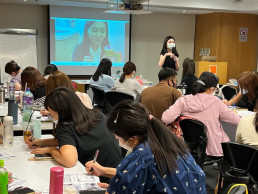
Professional workshops to improve professionals’ performance
As it takes time to complete the entire Facilitator Certification Programme, many participants are deterred by their heavy workload. In view of this, the three NGO partners also developed shorter courses at the vocational level. In addition to seminars for professionals to have a preliminary understanding of the programme, a six-hour “professional training workshop” is also provided for those who wish to learn the interactive skills. The workshop attracted participants from a variety of professions, including school teachers, principals, speech therapists, occupational therapists, and psychiatric nurses, etc. It is hoped that the skills taught in the workshop can be more widely used in the community.
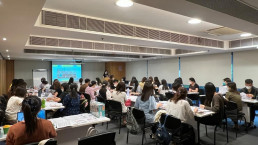
Parent-child Toy Sets with Repackaged Course Manuals to Promote Communication
Redesigning localised materials to enhance integration
The programme is accredited by WHO and in order to localise it, the three NGO partners collaborated with Prudence, the illustrator and Creative Director of Chocolate Rain, to repackage the manuals for instructors and parents in Hong Kong’s version, hoping that users can utilise the skills more proficiently. The pivotal point to work with Prudence comes from the intention to visualize the skills through the illustrator’s colourful world. Ms. Chan said, “Despite the fact that all characters in Chocolate Rain have their eyes closed and feel the world with their hearts, we want the parents to communicate with their children not only with their hearts but also through eye contact, so we invited Prudence to create the characters, and repackage the manuals.”
The manuals are the perfect complement for parents to learn and adopt the skills thoroughly and effectively. Ms. Lung indicated that it is significant to earn resonance among the parents, “I remember the original manual mentioned ‘congee’ as a tea-time snack but for most Asian parents in general, diet is a vital part of life and congee is a staple dish in Hong Kong. Therefore, we changed it to other snacks, such as fruits and biscuits, making it more readily acceptable to the parents. Moreover, there was a chapter on ‘self-care’ which used hand-washing as an example. However, hand-washing has become a daily routine during the pandemic, so we changed it to putting on shoes, which is a common setback that troubles parents when going out with their kids. We hope the manual can match our lifestyle and daily lives of parents in Hong Kong closely.”
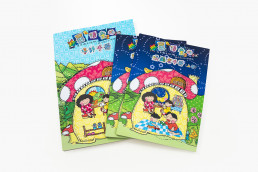
Content improvement leads to easy application
The repackaged manual summarises the course content into “Five Principles” and “Ten Parenting Skills”. Ms. Chan admitted that a lot of effort was spent in translating English to Chinese, “In fact, this is our second translation for localising the original content. For instance, the word ‘Imitation’ was translated directly in written language in our first attempt. This time, we simplified it as ‘Following’. For the phrase “Environment setting”, we amended it to “Tidying up”. We hope that parents would be able to grasp the meaning once they see the name of the skills.” Ms. Wong believes that transforming the “Ten Parenting Skills” into games is an extraordinary way to summarise the course, “Parents can recap the skills they learnt in the course and gradually apply the skills by using this image.”
Solving “game” problem with a brand-new toy set
In addition to the manuals that are essential for the training, the three NGOs have developed a “parent-child play set” with the appeal of “no rigid rules on the ways to play” to create new excitement for both parents and children to tie in with the course and alleviate parents’ burden. The programme encourages parents to take the initiative to create opportunities for interaction with their children and to prepare surprises while matching their children’s level of play. Ms. Chan stated that she wanted to make game-planning easier for parents, “We intend to create a set of ‘accessories’ that match the toys they already own, so that they can play with their children easily without over-scrutinising. Parents are also encouraged to practise relevant skills at home. Without purchasing extra toys, this toy set could be a great ‘assistant’ already!”
Four levels of play for children of different ages
It took a lot of effort on the design and development of this toy set. Eventually, the toy designer and NGOs decided to use magnet box as the main assembly. The appearance and the intensity of the magnet are the major factors to the design. This toy set offers four levels of play including “simple play”, “put-together play”, “simple pretend play” and “advanced pretend play” for children of the age two to six, ensuring that all target children can participate.
Ms. Wong said, “I hope this toy set can simulate familiar scenes in children’s daily life, so that they can interact with their parents while playing. That’s also one of the primary principals of the training that everything happens in real life, not on the training table.” Ms. Lung pointed out that it is usual for parents to assume the way of playing for a toy but with this toy set with no specific rules, children’s creativity can be unleashed easily. “Parents will also be able to apply the skill of ‘Following’ by paying attention to how their children play,” Ms. Lung added.
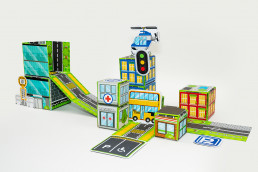
“Enlarged” toy sets in Ocean Park to increase opportunity for inclusion and communication
At the Summit in Ocean Park this summer, JC A-Connect constructed an interactive world of WHO-CST for a month and a half. The theme of the game area included scenes from everyday life such as supermarkets, car repair shops, and picnic spots. The parent-child toy set was transformed into giant installations and practical parenting skills covered in the programme were shared with the public, allowing participants to play different roles in daily life and thus improving parent-child communication.
The parent-child toy set was also unveiled for the first time in the WHO-CST workshops held during the event. “We hope parents can let go of their ‘learning’ mindset and concentrate on playing with their children in Ocean Park,” Ms. Chan remarked. Apart from enabling families who have attended the programme to recapture the parenting skills, the workshops also provided an opportunity for Master Trainers and Facilitators to observe parent-child interactions and offer guidance to parents, thus enriching their interactions with children. Ms. Lung also said, “We hope that parents will understand that the ‘Ten Parenting Skills’ can be applied in daily life and the play area is a wonderful place for them to practice the skills.”
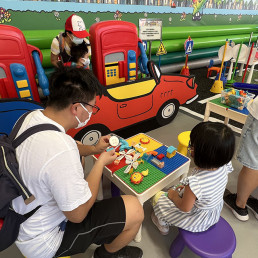
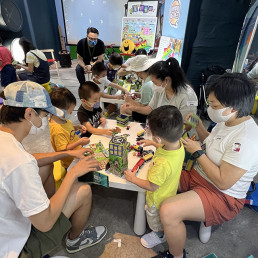
Participants’ Sharing
Professional Worker: Ms. Chan Ka Yue, Registered Social Worker and Graduate of the First Facilitator Certification Programme
Strengthening parent-child relationship by helping them to communicate
Ms. Chan Ka Yue, a school social worker who had participated in the Facilitator Certification Programme, said that it is common to encounter children with ASD in kindergartens. Since more and more young children have learning needs in this area, the relevant support has become more important. In addition to the children, parents also require assistance. “Families with kids who have special education needs can find it harder to educate their children but they don’t get the level of support they need. Through the WHO-CST programme, parents can understand their children more easily, which also makes the programme more engaging. Parents will be able to build and consolidate relationships with each other, accompany and support each other when they take the course, which is very valuable,” Ms. Chan added.
Ms. Chan was introduced to the programme by a colleague and she signed up because she was drawn to its rich content. She stated that she can conduct counselling with parents more effectively after the training. “In the past, I intervened and offered counselling based on my own understanding of the child or the family but I may not be able to share specific skills with the parents. After the intensive training, I believe I can assist parents in improving their daily interactions with their kids and strengthening their parent-children relationships,” said Ms. Chan.
Early intervention to seize the golden treatment period
“Golden Treatment Period” for young children with ASD is between the age of two to six in general. Therefore, early intervention and identification are especially crucial. Ms. Chan believes that if the programme can be widely implemented in kindergartens, it will definitely benefit children’s future growth and development. For parents, the course help them understand their children early. Ms. Chan said, “Due to the lack of understanding, parents may educate their kids in a wrong way, which would worsen their relationships. As for the teachers, they can apply these skills in classes, so that children can receive more effective support to a greater extent.”
Parent: Lester, Participant of WHO-CST
Learning through communication – the importance of communicating with companions
Lester, a father of boy and girl twins with ASD, expresses how helpful the programme has been for him. “Before taking the training, when I played with my kids, they might ignore me and show different emotions. The course taught me the skills to communicate with them properly, which is very important to me and my children,” he said. The training focuses more on “communication” than “learning”. According to Lester, the “Ten Parenting Skills” have been exceptionally useful to him, “The social worker advised me to follow the lead of my kids so they can eventually feel comfortable to get closer to me. I may also convey new information to them while playing. I didn’t realise that skill is called ‘Following’ until much later.”
The relationship between Lester and his children has become harmonious after he learnt to interact with them. He is also amazed by their remarkable progress. The programme gave him the opportunity to learn new parenting skills while getting to know many others who are in similar situations at the same time. “Children with special education needs (SEN) have a variety of symptoms. It is common for parents to express their thoughts on parenting, which is incredibly beneficial to me,” he added.
Same Among the Differences
Since the introduction of the WHO-CST programme in 2018, JC A-Connect has been actively training local Master Trainers and Facilitators for the sake of promoting the programme to the community. By this date, nine Master Trainers and 26 Facilitators have completed the training. They are from different sectors and are committed to planting the “seeds”, so that the programme can sprout, grow and irrigate the hearts.
Carrying the programme forward and teaching parents to apply the skills
Ms. Lam Suet Man, supervisor of TWGHs Ho Yuk Ching Educational Psychology Service Centre, hoped that the WHO-CST programme could be carried forward in different levels and units, “Taking in the content of the programme is not easy. To understand the skills that are often told and implement them properly, one must be clear about the underlying philosophy. We hope that both trainers and parents can support each other as they are ‘in the same shoes’.” A Facilitator from the same organisation, Ms. Chan said “early intervention” is still the future goal, “It is important to grasp the golden treatment period. All individual coaching in the programme is tailor-made for parents to apply the skills on their children carefully,” she said.
Staying true to your original aspiration and establishing parent-child relationship
The WHO-CST programme focuses on how parents communicate with their children effectively. Master Trainer, Ms. Wong described the programme as “staying true to your original aspiration”, “This programme enlightens parents to accept their children’s slowness and stubbornness and understand their children’s needs. It is a starting point to build a good relationship with children before learning any skills,” she added.
Exchanging knowledge with reward greater than dedication
According to Master Trainer Ms. Lung, the collaboration between the three NGOs in flourishing this programme is rare. Professionals from different sectors can put this opportunity to good use to learn from each other and hone their skills. Regarding the future prospect, she hoped that more professionals and parents would become aware of the programme, “Even though participating in the programme requires some effort and time, the benefits far outweigh the costs. I hope that, as much as we care about the children, we should also support and care for the parents, who may also experience various emotions and a sense of powerlessness.”
Subscribe to Our Newsletter
Please keep in touch with us and we will keep you updated with
the latest news, events and news.


